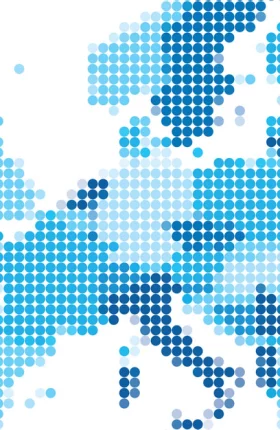Europe is striving to frame its societal vision for the next decade, and digital plans play a vital role. From defining its new Digital Compass to reviewing its industrial policy and taking global leadership on digital regulation, the EU can make 2021 a turning point, positioning itself and its citizens to benefit fully from the digital revolution.
A vibrant digital economy can enable concrete solutions to Europe’s major challenges. An expanding wealth divide can worsen when access is not equal or when individuals and businesses do not use the digital tools already available. The efficient delivery of fundamental services, such as education and health care, depends more and more on digitization. Entire industries are converting quickly, with big ramifications for jobs, among other things. Automation will drive an employment evolution, requiring massive training and upskilling programs so that workers can fill new positions and companies can meet evolving staff needs. But the training itself often requires digital access and digital literacy.
European telcos and their partners are uniquely placed to advance solutions that can propel Europe’s capacity to accelerate economic and social progress. A new report by ETNO , the European Telecommunications Network Operators’ Association, supported by BCG, spotlights five opportunities:
- Constructing the foundation for access with networks and connectivity.
- Helping Europeans establish leadership in data and services.
- Expanding the continent’s reach by furthering the digitization of the economy and society.
- Advancing citizens’ readiness by building digital skills.
- Energizing the spirit of European innovation by working toward an industrial strategy and cooperation across sectors.
Telecom leaders understand that the service their companies provide is fundamental, and Europe’s telcos know that their viability depends on delivering innovative products and services, built on the foundation of digital infrastructure, that enable others to do more in a sustainable digital economy and society.
Our conversations with the leaders of Europe’s telcos indicate that the commitment is there. “Telcos have a vital role and a big responsibility in helping to address societal challenges,” Telia CEO Allison Kirkby told us. “In five years’ time, I would like to see headlines about how digitalization enabled by telcos has allowed economic recovery post-COVID, contributed to greater digital inclusion in all its forms and accelerated the climate transition.” Vivacom CEO Atanas Dobrev put it this way: “We can either take a lead in guiding society to digitization, or they will go there without us.”
European cooperation is the starting point. Policymakers and the telecom industry have long debated the proper role for – and the rules regulating – Europe’s telcos. Meanwhile, technologies advance, startups armed with new tech and business models disrupt long-established industries, and consumers embrace new ways of doing things. Having opened substantial leads in foundational technologies such as cloud, the US and China are now spearheading technologies of the future such as artificial intelligence, spatial computing, and – in time – quantum computing. Europe needs to move forward together, now. A future of innovation requires a new paradigm rooted in cooperation, not in consumer price-centered regulation that struggles to keep pace with the evolving marketplace.
Europe needs to move forward together, now. A future of innovation requires a new paradigm rooted in cooperation, not in consumer price-centered regulation that struggles to keep pace with the evolving marketplace.
Here’s a look at the five areas in which telcos can lead this change for the benefit of the whole of Europe. In each, the industry is ready to act, but cooperation from the public sector is essential to achieving common goals.
Constructing the Foundation for Access
Europe’s telcos are building the networks that are indispensable to digitizing society. This will require an estimated additional €150 billion to upgrade fixed infrastructure to gigabit speeds and another €150 billion to enable a comprehensive 5G vision. Telcos are already mobilizing massive investment to build digital infrastructure and expand capacity and coverage, with the ambition of connecting everyone through high-quality networks. The goal is to ensure that all sectors of the economy and society benefit from new-generation networks and the services they enable. As Timotheus Höttges, CEO of Deutsche Telekom, put it: “Without networks and digital infrastructure, the discussion about digital inclusion is only theory.”
Efficient use of network capacity, also driven by economic incentives, will be key to aligning increasing demand with improved environmental standards. Sustainability is a big part of telco decision-making. Companies understand that profitability must go hand in hand with societal contribution.
Governments and regulators can help speed the process and increase impact. Investment in European network rollout must become economically attractive again, with regulatory certainty for the long-term. This is relevant to all sectors of Europe’s economy and society. Spectrum and other public resources such as installation sites should be allocated in a timely and cost-effective manner under the right conditions. The common aim should be to reach every European. That will require building global scale for the telecom sector and encouraging horizontal cooperation with other sectors. A fresh, renewed policy attention to the demand side is also needed. Promoting uptake of new digital networks is Europe’s way to digitize the continent and improve sustainability.
Establishing Leadership in Data and Services
It will take shared platforms – born from Europe’s values and tailored to its needs – to set a new digital standard that Europeans can rely on because it safeguards data, protects people, and secures connection. Today, 78% of the global cloud market is controlled by the top four players, none of which is European. Europe must set its ambition higher and assert leadership in data and services.
Today, 78% of the global cloud market is controlled by the top four players, none of which is European. Europe must set its ambition higher and assert leadership in data and services.
Telcos are increasingly active in creating and implementing European leadership and standards in areas such as edge computing, Open RAN, and cloud solutions. They can work together in a united and open way with other industrial players to enable scalable solutions where Europe can take a lead. One possibility is eID, which offers secure identification solutions such as mobile ID.
Governments and regulators can foster and incentivize European platforms and initiatives on random-access networks as well as cloud and edge computing. Collaboration at the network and service levels should be supported. Digitization of public services should be used as a lever to broaden acceptance of the new technologies.
Furthering Digitization of the Economy and Society
Europe needs to accelerate digitization in areas with the most societal value. Today, 83% of EU small and medium-sized enterprises (SMEs) do not use advanced cloud services, and more than 60% of nine-year-olds attend schools that are not digitally equipped.
Telcos are already speeding the digitization journey with new products and solutions developed on their own or through public-private partnerships. They can expand these efforts in key areas. Telcos can help ensure continuity of education, improve the resiliency of small businesses, and enable other industrial sectors to improve their productivity, innovation potential, and sustainability, while cutting greenhouse gas emissions.
Policymakers can help by developing ambitious policy targets for inspiring digitization across industrial sectors and in public administration. Public funding packages can be directed to create social benefit through digitization, and they can lower bureaucratic hurdles to access digital funding.
Developing Digital Skills
Europe needs to upskill and reskill the population and workforce of tomorrow by taking digital literacy to the next level. Today, 42% of Europeans lack basic digital skills, while 57% of companies are struggling to find ICT personnel.
Europe must take digital literacy to the next level. Today, 42% of Europeans lack basic digital skills, while 57% of companies are struggling to find ICT personnel.
Some telcos are already providing training platforms, promoting responsible use of technology and fostering digital inclusion of everyone. They are becoming the partner of reference for promotion of digital skills. They can further contribute to Europe’s digital advancement by scaling up their current programs, creating broader awareness of the need, expanding training platforms, and supporting the development of certification standards.
The public sector can collaborate by professionalizing digital literacy across the EU. It can help citizens obtain the skills required for work and life in the digital economy. By prioritizing digital upskilling and reskilling and setting clear targets and incentives, EU governments and public institutions can promote the importance of digital skills.
Advancing Industrial Strategy and Cooperation
Fostering development of digital innovation ecosystems can combat some of our biggest challenges, such as climate change, and become the engine of invention and progress for years to come. The telecom sector can intensify its active role in orchestrating cross-sector and cross-industry collaborations to develop innovations and new technologies. It already invests in new and upcoming technologies and venture capital to strengthen the European tech sector. It can also share investments, resources, and knowledge across sectors and industries to create innovative use cases with far-reaching impact.
Policymakers should support collaborations and build scale by enabling entrepreneurial partnerships beyond infrastructure. They can allow consolidation within and across countries to enable telcos to build more scalable solutions and compete on a global level, and they can direct funding toward startups and venture capital to support the development of new technologies.
Europe needs to up its game. It has the know-how and the resources. It has been a leader in such technologies as cellular communications and semiconductor design. But Europe’s governments cannot meet the challenges without support and assistance from the private sector. And Europe’s telcos will require help from the public sector to create business models that are viable in an increasingly digital future. Moving Europe forward will be a team effort. The telecom industry is ready to do its part.








